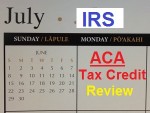The IRS issued a mid-year ACA tax credit check up advisory to remind individuals and families to report household changes if they are receiving Advance Premium Tax Credits to lower their monthly health insurance premiums. Most notable is the admonition that if the household income exceeds 400% of the federal poverty lineas reported on their […]





